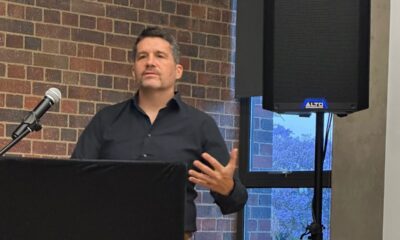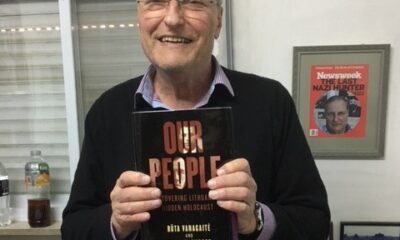
Featured Item

Praying to live or die – survivors’ complex relationship with G-d
When talking about the Holocaust, people often wonder if Jews held onto their faith during humanity’s darkest hour. But Yad Vashem educator Dr David Deutsch says that victims often had a complex relationship with G-d, and that they held onto or abandoned their faith depending on their circumstances.
“Only those who believed in G-d survived,” said one survivor in testimony recording by the USC Shoah Foundation. “To survive, you couldn’t think of faith or anything spiritual. You had to become like an animal, and your job was to make sure you had enough food and didn’t go to the slaughterhouse. If you thought of faith, you became lost. Thinking about G-d wasn’t favourable for survival,” said another survivor, in testimony shared by Deutsch.
Deutsch shared these and other testimonies with a large audience at Limmud Cape Town, under the topic, “Faith, prayer and belief under Nazi rule: prisoners talking about G-d.”
He said he “stumbled upon this topic by chance, and it changed the way I believe”. Using oral testimonies, his session emphasised how Jews in the ghettos and camps attempted to maintain their beliefs and traditions in a world of chaos and in spite of inhumane conditions. The lecture also demonstrated how Jewish prisoners created different and new perceptions of G-d under Nazi oppression.
For example, one survivor spoke about how frustrating she found it when people expected her to believe in G-d because she survived. She spoke of how she couldn’t understand why so many “excellent people” like artists, academics, and leaders died, while she, a simple teenager at the time, survived. “How could G-d allow me to step over the bodies?” she asked rhetorically. She said it was this that made her question her faith after she survived.
Deutsch said such testimony should “expand the way we listen” to survivors, and that we shouldn’t put them into a box defined by our own expectations. He implored the audience not to have preconceived ideas about survivors’ spirituality, but rather to be open to their reality – even if it wasn’t easy to hear.
Another survivor described how her relationship to G-d changed from moment to moment. As she was marched to work in the freezing cold, she asked G-d why He did this to them. “I told him, ‘I don’t like you anymore.’” But then she asked for forgiveness, as she had lost everyone and realised G-d was her “only friend”. Her testimony showed how people viewed G-d less as an authority and more of a companion, and that their relationship with the divine was constantly in flux.
Another woman spoke of how she strongly believed in G-d during the Holocaust, but afterwards lost her faith. She spoke of how on Yom Kippur, it should be G-d asking her for forgiveness, not the other way around. Now in her later years, she’s welcoming religion back into her life. Asked if she believed in G-d now, she responded, “Well, we’re talking!”
Deutsch noted that the way people prayed also evolved, because time changed in the universe of the camps. “People could pray to survive only the next 12 hours. Anything more led to despair,” said one survivor.
People didn’t just pray to survive. Some described how they prayed to die soon, quickly, or peacefully. One survivor prayed that she would die next to a tree – close to a little bit of nature in such a stark environment. One woman described the humiliation of her and other women being made to wash and parade naked in front of German guards, who laughed and mocked them. “I prayed the end of the world would come in that moment. That a hole would open up, and everyone would sink in. But that didn’t happen,” she said.
Deutsch pointed out that prayers like this gave survivors a tiny bit of control in a situation where all agency had been taken away. He said sometimes people prayed even if they had lost their faith.
Another survivor’s testimony showed how she held onto tradition, but also turned it around to suit her circumstances. She spoke of the Pesach seder, and how the prisoners in the camp experienced all the plagues, from lice to death of the first born. “She makes herself a recipient of G-d’s anger,” said Deutsch. He pointed out that “turning over” a ritual in this way helped survivors make sense of a world that was completely senseless.
This same survivor went on to host music and theatre shows in the camps as a way to uplift other inmates. In this way, she shifted the structure in the camps, said Deutsch. “She brought the divine in.”










